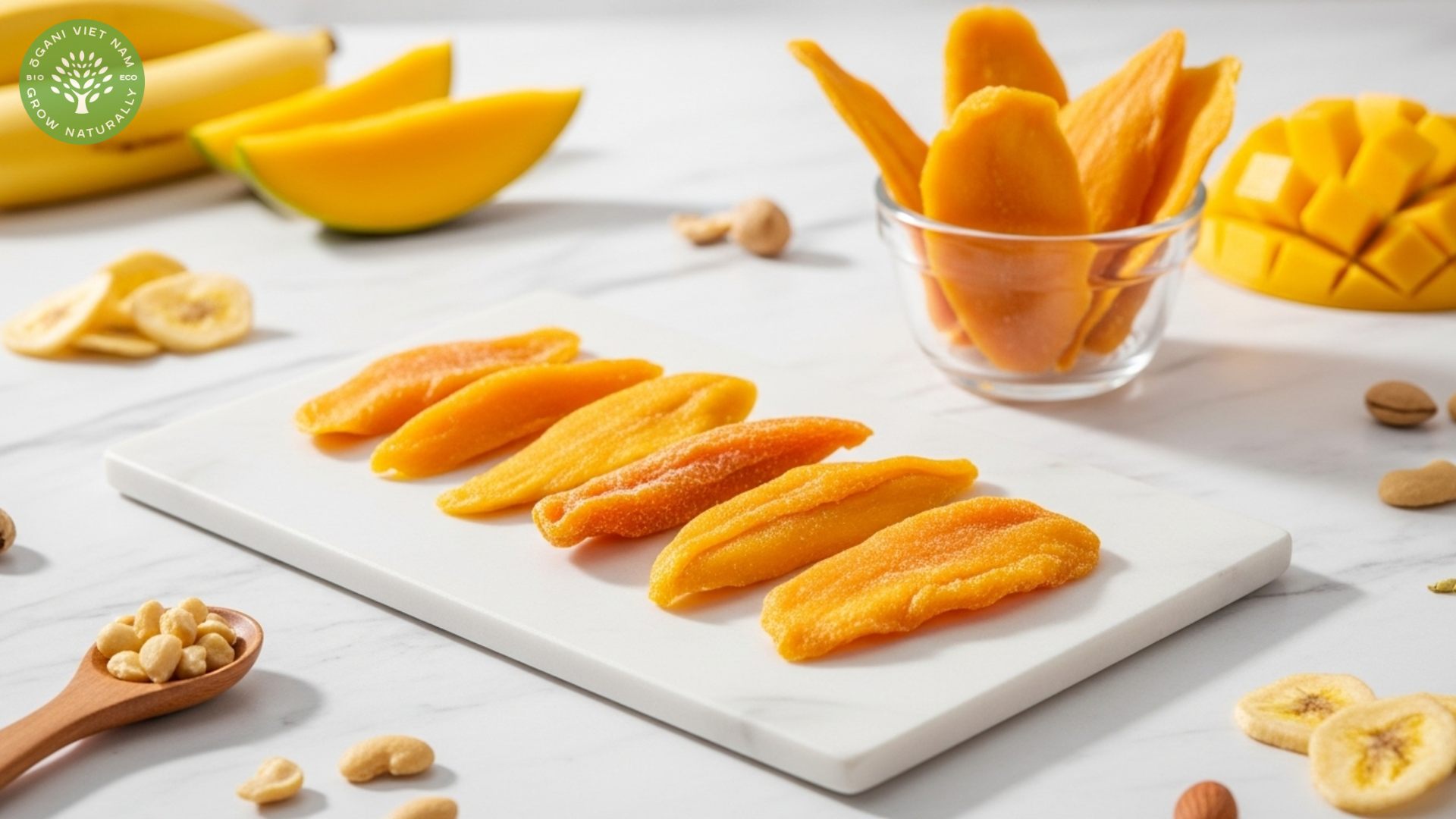Dried mango potassium content typically ranges from 188-450mg per 100 grams, making it a significant source of this essential mineral for heart health and muscle function. At Ogani VN, we understand that many health-conscious consumers are searching for natural potassium sources, and dried mango stands out as both delicious and nutritionally valuable.
Dried mango potassium content vs fresh alternatives
The dehydration process concentrates nutrients in dried fruits, and mango is no exception. When we compare dried mango potassium levels to other fruits, the results are quite impressive. A 100-gram serving of dried mango contains approximately 350-450mg of potassium, depending on the processing method and brand quality.
Fresh mango contains about 168mg of potassium per 100 grams, which means the dried version offers nearly 2.5 times more potassium density. This concentration occurs because water removal during the drying process leaves behind concentrated minerals and vitamins. However, it’s worth noting that you’ll also consume more calories and natural sugars with dried varieties.
Compared to other high-potassium fruits like bananas (358mg per 100g fresh), dried mango holds its own as a viable potassium source. The convenience factor makes dried mango particularly appealing for busy lifestyles – you can easily pack it for travel, store it long-term, and enjoy consistent potassium intake without worrying about ripeness.
Health benefits of dried mango potassium
Cardiovascular support and blood pressure regulation
Potassium plays a crucial role in maintaining healthy blood pressure levels by counteracting sodium’s effects in your body. The dried mango potassium you consume helps your blood vessels relax, reducing strain on your cardiovascular system. Research shows that adequate potassium intake can lower the risk of stroke and heart disease.
When you snack on our premium dried mango, you’re getting more than just a sweet treat. The potassium works alongside other minerals to support proper heart rhythm and circulation. This is particularly beneficial for people with active lifestyles or those managing blood pressure concerns under medical supervision.
Muscle function and exercise recovery
Athletes and fitness enthusiasts often overlook dried fruits as potassium sources, but they shouldn’t. The potassium in dried mango supports proper muscle contraction and helps prevent cramps during or after exercise. Your muscles need adequate electrolyte balance to function optimally, and potassium is a key player in this process.
The natural sugars in dried mango also provide quick energy, while the potassium aids in muscle recovery. This combination makes it an excellent pre or post-workout snack. We’ve noticed many of our customers at Ogani VN incorporate dried mango into their fitness routines for exactly these reasons.
Nerve function and cellular health
Beyond muscles and heart health, potassium from dried mango supports proper nerve signal transmission throughout your body. Every nerve impulse relies on the movement of potassium and sodium across cell membranes. Maintaining adequate potassium levels helps ensure your nervous system functions smoothly.
The concentrated nutrients in dried mango, including potassium, also support overall cellular metabolism. Your cells use potassium to maintain proper fluid balance and facilitate various biochemical processes essential for energy production and waste removal.
Dried mango potassium nutritional profile and daily value
Understanding how dried mango potassium fits into your daily nutrition plan requires looking at the bigger picture. A typical 40-gram serving (about 1/4 cup) of dried mango provides roughly 140-180mg of potassium, which represents about 4-5% of the daily recommended intake for most adults.
The daily potassium recommendation for adults is 2,600mg for women and 3,400mg for men, according to current dietary guidelines. While dried mango alone won’t meet all your potassium needs, it can be a valuable contributor to your overall intake when combined with other potassium-rich foods like leafy greens, potatoes, and legumes.
It’s important to balance the potassium benefits with awareness of the sugar content. Dried mango contains concentrated natural sugars – about 27 grams per 40-gram serving. This isn’t necessarily problematic for active individuals or those without blood sugar concerns, but it’s something to consider in your overall daily carbohydrate intake.
The fiber content in dried mango (about 1 gram per serving) is lower than fresh mango due to processing, but it still contributes to digestive health. The vitamin C content remains significant at about 19% of daily value per serving, working synergistically with potassium for overall health benefits.
Best practices for dried mango potassium consumption
Portion control and timing strategies
Smart consumption of dried mango maximizes the dried mango potassium benefits while managing calorie intake. We recommend limiting portions to 30-40 grams (roughly 1/4 cup) per serving. This amount provides meaningful potassium without excessive sugar intake.
Timing your dried mango consumption can enhance its benefits. Consuming it 30-60 minutes before exercise provides quick energy and potassium for muscle function. Post-workout consumption aids in muscle recovery and electrolyte replenishment. Many of our Ogani VN customers find that splitting their daily dried mango intake between pre and post-workout serves them best.
For those not exercising regularly, incorporating dried mango into breakfast or as an afternoon snack works well. The natural sugars provide sustained energy, while the potassium contributes to daily mineral goals. Pairing it with protein or healthy fats can slow sugar absorption and create more balanced blood sugar levels.
Combining with other potassium sources
Creating a comprehensive potassium strategy involves combining dried mango potassium with other high-potassium foods throughout your day. Consider pairing dried mango with nuts or seeds for a balanced snack that provides potassium, healthy fats, and protein.
Breakfast combinations work particularly well – add chopped dried mango to oatmeal along with banana slices for a potassium-rich start to your day. The variety ensures you’re getting potassium from different sources, each bringing unique additional nutrients to the table.
For lunch or dinner, consider incorporating dried mango into salads with leafy greens, or use it in grain bowls alongside potassium-rich vegetables like sweet potatoes or spinach. This approach creates meals that are both nutritionally dense and satisfying.
Frequently Asked Questions
How much potassium is in a typical serving of dried mango? A standard 40-gram serving contains approximately 140-180mg of potassium, which varies by brand and processing method.
Can I rely on dried mango as my primary potassium source? While dried mango provides valuable potassium, it should be part of a varied diet including vegetables, legumes, and other fruits to meet daily potassium requirements.
Is the potassium in dried mango as bioavailable as in fresh fruit? Yes, the potassium in dried mango remains highly bioavailable. The drying process concentrates the mineral without affecting its absorption.
Should people with kidney problems avoid dried mango? Individuals with kidney disease should consult their healthcare provider before increasing potassium intake, as kidney function affects potassium processing.
How does organic dried mango compare for potassium content? Organic and conventional dried mango have similar potassium levels. The processing method affects potassium concentration more than organic certification.
Make the most of dried mango potassium in your daily nutrition
Dried mango potassium offers a convenient, delicious way to boost your daily potassium intake while enjoying natural sweetness and energy. The concentrated minerals in quality dried mango support cardiovascular health, muscle function, and overall cellular wellness when incorporated thoughtfully into a balanced diet.
At Ogani VN, we’re committed to providing premium dried mango that delivers both exceptional taste and nutritional value. Whether you’re an athlete seeking natural electrolyte sources, a health-conscious individual working to improve your mineral intake, or simply someone who enjoys nutritious snacks, our dried mango products can support your wellness goals.
Ready to experience the potassium benefits of premium dried mango? Browse our selection of organic, naturally processed dried fruits and discover why quality makes all the difference in both taste and nutrition. Contact our nutrition team for personalized recommendations on incorporating dried mango into your specific dietary needs.
Read more:
- Dried Mango Nutrition Facts: Complete Guide To Calories, Benefits & Health Impact
- Best Dried Mango No Sugar Added: Premium Quality Guide
- Calories In Dried Mango No Sugar Added: Complete Nutrition Guide
- Dried Mango No Added Sugar: Your Complete Guide To Natural Sweet Snacking
- Dried Mango Potassium: Complete Nutritional Guide


